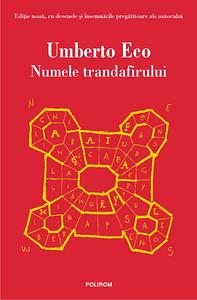Take a photo of a barcode or cover
Slog, slog, slog, I don’t care about actual religious history let alone rambling fictional religious history that is in no way necessary to move the story along. Finished it but skimmed 80%. Also, called the killer by page 75. Rare case where I would think the movie would be better than the book.
I really liked this book, even though the plot was constantly complicated and slowed down by extensive philosophical, historical and theological reflections. For the longest time, I intended to give it three stars (since these very reflections threatened to drain the plot from any excitement), but the final 30 pages made me realize how much I had come to care about the abbey and the people in it. I love it when an author is able to make me care about a place like that.
Moreover, even though Eco has a tendency to describe everything into the smallest details (which is both impressive and tiresome) and to create long lists enumerating everything the protagonist encounters or experiences, he is also a philosophy virtuoso. That is to say, excessively descriptive run-on sentences, such as: "He showed as a delicate aedicula with two columns of lapis lazuli and gold which framed an Entombment of Christ in fine silver bas-relief surmounted by a golden cross set with thirteen diamonds against a background of grainy onyx, while the little pediment was scalloped with agate and rubies" are offset by the most brilliant passages:
"Until then I had thought each book spoke of the things, human or divine, that lie outside books. Now I realized that not infrequently books speak of books: it is as if they spoke among themselves. In the light of this reflection, the library seemed all the more disturbing to me. It was then the place of a long, centuries-old murmuring, an imperceptible dialogue between one parchment and another, a living thing, a receptacle of powers not to be ruled by a human mind, a treasure of secrets emanated by many minds, surviving the death of those who had produced them or had been their conveyors."
It is passages such as these, both apt and beautiful, that really made the book come alive for me, and for that alone Eco deserves more than three stars.
Moreover, even though Eco has a tendency to describe everything into the smallest details (which is both impressive and tiresome) and to create long lists enumerating everything the protagonist encounters or experiences, he is also a philosophy virtuoso. That is to say, excessively descriptive run-on sentences, such as: "He showed as a delicate aedicula with two columns of lapis lazuli and gold which framed an Entombment of Christ in fine silver bas-relief surmounted by a golden cross set with thirteen diamonds against a background of grainy onyx, while the little pediment was scalloped with agate and rubies" are offset by the most brilliant passages:
"Until then I had thought each book spoke of the things, human or divine, that lie outside books. Now I realized that not infrequently books speak of books: it is as if they spoke among themselves. In the light of this reflection, the library seemed all the more disturbing to me. It was then the place of a long, centuries-old murmuring, an imperceptible dialogue between one parchment and another, a living thing, a receptacle of powers not to be ruled by a human mind, a treasure of secrets emanated by many minds, surviving the death of those who had produced them or had been their conveyors."
It is passages such as these, both apt and beautiful, that really made the book come alive for me, and for that alone Eco deserves more than three stars.
adventurous
informative
mysterious
slow-paced
Plot or Character Driven:
Plot
Strong character development:
Yes
Loveable characters:
Yes
Diverse cast of characters:
Yes
Flaws of characters a main focus:
No
I will readily admit that the author is incredibly skilled and he has an amazing way with words. Nevertheless I struggled to finish this book. Maybe it was the passages in Latin or perhaps the lack of any kind of a developed female character but overall I found this book a trial and was almost egging on the murderer to finish them all off just to be done with the thing!
My first and favorite of Umberto Eco's novels. I revisit it every so often.
it's me, not the book. this book deserves our time and full intellectual and emotional capacities. in other words, you can't read it if you're in the bus or train on your way to work or when you're about to fall asleep. i jumped ship, and i will never finish it. not in this incarnation. but maybe in one of the next i will have the opportunity to give it what it deserves; my full attention. i read about 200 pages and enjoyed it very much, but there is always the sense of too much details. and here umberto eco the historian won over the fiction writer, but the reader is the ultimate loser. too many details until one feels the equivalent of a swimmer under a great current, pushing him down into the darkness where the story is no longer to be seen. a simple story, a wonderful story dealing with the power of text. still, 4 stars for a gratifying read, one that can take you back in time to where words were not taken lightly.
slow-paced
dark
mysterious
tense
medium-paced
I decided to read this book while traveling in Italy. It took me *forever* to get through the first quarter, I must admit, but I really liked it in the end. It's a murder mystery featuring a lot of geeky medieval history and even geekier literary references. It's pretty fun, really, especially one you give up on translating all the Latin (or switch to an e-reader that will do it for you). Along the way, Eco takes up a lot of interesting philosophical debates--makes you think (while you are trying to figure out whodunnit at the same time).





